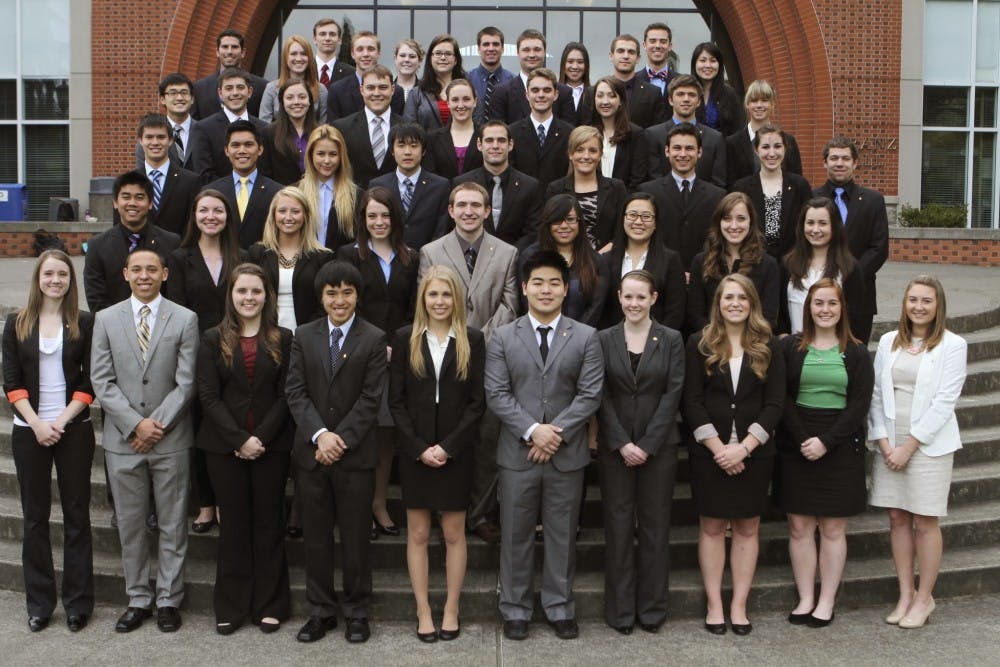By Maggie Smet |
“Bigs”, “littles”, rushing, symbols and parties: all the hallmarks of Greek Life culture seen at other schools and on The Bluff 25 years ago. While most students and administrators at UP don’t yearn for the days of Greek Life, some of the activities and connections previously forged at UP are making a comeback.
Greeks at UP
Greek life at UP began in 1950 with the establishment of Upsilon Omega Pi fraternity, followed by various sororities and fraternities. According to archivist Fr. Jeffrey Schneibel, the administration encouraged these social organizations in the beginning, as they connected the large commuter student population to campus life.
There were never official houses for these organizations. Members lived in dorms and used symbols like sweaters and badges to distinguish themselves. During rush week, incoming members might have to carry a fraternity handbook or a large stone around campus to distinguish them as pledges of a certain chapter.
A Dec. 13, 1963 Beacon article describes the Rush or “Hell Week” pranks that both fraternity members and pledges played on each other.
One student, Ron Ayotte, was tied up by his fraternity brothers, covered in a bed sheet, taken to Portland State College and dumped in an ice bucket in the cafeteria.
A nearby dining hall worker tried to catch him – only to be left with a sheet in her hands and Ayotte running to the main dining room. Ayotte received raucous applause from the students of Portland State, and was quoted saying that he “loved every minute of it.”
According to Schneibel, the popularity of fraternities and sororities on campus ebbed and flowed throughout the years. In 1989, six chapters were on campus, some locally founded and others affiliated with national organizations.
After hazing incidents involving Psi Chi Eta and Iota Kappa Pi, UP implemented anti-hazing rules. These incidents included underage drinking, inappropriate charade games and other activities to initiate new members. As a result, local fraternities with no national governance could not have a traditional pledging week, and hazing was expressly forbidden.
Leaders of each organization had to work closely with student activities to establish yearly goals and conduct evaluations of their efforts. By 1993, all the fraternities and sororities had left. This was due to a lower membership rates, pressure from national Greek organizations and general distaste for the new guidelines.
Although it’s been 20 years since there was Greek life at UP, you can still hear some students refer to their “big sister” or “fraternity brother” because of connections forged through dorms and academic fraternities.
Big Sisters and Little Sisters in Kenna
Kenna Hall may be a dorm, not a sorority, but girls living in RA Gwen Getchell’s hall can choose to be a “big” or “little” sister to help build community in the residence halls.
Getchell wanted to find a way to connect upper and underclassmen on equal terms and discourage cliques in Kenna during her first year as RA. As the year goes on, she plans to do events like girls’ nights out and yoga for big and little sisters. For now, pairs hang out, leave notes and treats for each other and get to know each other better.
Sophomore Maryna Feldberg and her little sister freshman Anna Farello never had plans to join a sorority in college, but enjoy the connection they’ve established as hallmates.
“I remember when I came to UP, thinking ‘I wish I knew more people in Kenna because I saw them everyday, but I just didn’t know ‘Who are you, what year are you?’” Feldberg said.
For Getchell, this program offers an alternative to the “superficial” nature of sororities that pick their members. Instead, she sees her program as an opportunity for everyone to be involved and get to know the people they live with.
Brotherhood and Business
There is one fraternity that outlasted the social fraternities on The Bluff. Business fraternity Alpha Kappa Psi is a coed, national organization focused on professional development and networking in the business field.
In some aspects Alpha Kappa Psi is similar to fraternities at other schools. Membership is gained by rushing, which includes different events, interviews and quizzes. They do service with local organizations such as Friends of Trees. They also have a strong alumni base which helps with networking after graduation, much like a social fraternity.
This year Alpha Kappa Psi has 41 members and is open to students of all majors.
Although Alpha Kappa Psi has rush, President senior Arvin Ticzon stresses the importance of never hazing members and being vigilant of that behavior, especially in the wake of hazing scandals across the country. They have a judiciary committee of students and a faculty advisor that makes sure all members follow the rules.
“We do kind of party, but not excessively like a social fraternity would,” Ticzon said.








